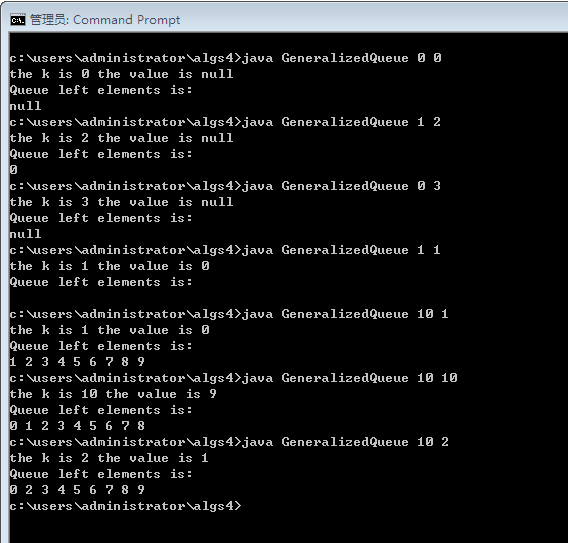1.3.38删除第k个元素。实现一个类并支持表1.3.12中的API:
表1.3.12泛型一般队列的API
public class GeneralizedQueue<Item>
GeneralizedQueue()//创建一条空队列
boolean isEmpty()//队列是否为空
void insert(Item x)//添加一个元素
Item delete(int k)//删除并返回最早插入的第k个元素
用链表实现该数据类型。注意:我们在第3章中介绍的算法和数据结构可以保证insert()和delete()的实现所需的运行时间和和队列中的元素数量成对数关系-请参见练习3.5.27。
答:

public class GeneralizedQueue<Item>
{
private class Node
{
Item item;
Node next;
}
private Node first=new Node();
private Node last=new Node();
private int N=0;
public GeneralizedQueue()
{}
public boolean isEmpty()
{return N==0;}
public void insert(Item x)
{
Node oldlast=last;
last=new Node();
last.item=x;
if(isEmpty())
first=last;
else
oldlast.next=last;
N++;
}
public Item delete(int k)
{
if(k<1 || k>N || N==0) return null;
int i=1;
Node current=new Node();
current.next=first;
while(i!=k)
{
current=current.next;
i++;
}
//
Item item;
if(k==1 && N==1)
{
item=current.next.item;
first=current.next.next;
last=first;
}
else if(k==1 && N>1)
{
item=current.next.item;
first=current.next.next;
}
else if(k==N && N>1)
{
item=current.next.item;
last=current;
last.next=null;
}
else
{
item=current.next.item;
current.next=current.next.next;
}
N--;
return item;
}
public void showAll()
{
Node current=first;
while(current!=null)
{
StdOut.print(current.item+" ");
current=current.next;
}
}
public static void main(String[] args)
{
int N=Integer.parseInt(args[0]);
int k=Integer.parseInt(args[1]);
GeneralizedQueue<Integer> gq=new GeneralizedQueue<Integer>();
for(int i=0;i<N;i++)
gq.insert(i);
//
StdOut.print("the k is "+k +" the value is " +gq.delete(k));
StdOut.printf(" Queue left elements is: ");
gq.showAll();
}
}
表1.3.12泛型一般队列的API
public class GeneralizedQueue<Item>
GeneralizedQueue()//创建一条空队列
boolean isEmpty()//队列是否为空
void insert(Item x)//添加一个元素
Item delete(int k)//删除并返回最早插入的第k个元素
用链表实现该数据类型。注意:我们在第3章中介绍的算法和数据结构可以保证insert()和delete()的实现所需的运行时间和和队列中的元素数量成对数关系-请参见练习3.5.27。
答:

public class GeneralizedQueue<Item>
{
private class Node
{
Item item;
Node next;
}
private Node first=new Node();
private Node last=new Node();
private int N=0;
public GeneralizedQueue()
{}
public boolean isEmpty()
{return N==0;}
public void insert(Item x)
{
Node oldlast=last;
last=new Node();
last.item=x;
if(isEmpty())
first=last;
else
oldlast.next=last;
N++;
}
public Item delete(int k)
{
if(k<1 || k>N || N==0) return null;
int i=1;
Node current=new Node();
current.next=first;
while(i!=k)
{
current=current.next;
i++;
}
//
Item item;
if(k==1 && N==1)
{
item=current.next.item;
first=current.next.next;
last=first;
}
else if(k==1 && N>1)
{
item=current.next.item;
first=current.next.next;
}
else if(k==N && N>1)
{
item=current.next.item;
last=current;
last.next=null;
}
else
{
item=current.next.item;
current.next=current.next.next;
}
N--;
return item;
}
public void showAll()
{
Node current=first;
while(current!=null)
{
StdOut.print(current.item+" ");
current=current.next;
}
}
public static void main(String[] args)
{
int N=Integer.parseInt(args[0]);
int k=Integer.parseInt(args[1]);
GeneralizedQueue<Integer> gq=new GeneralizedQueue<Integer>();
for(int i=0;i<N;i++)
gq.insert(i);
//
StdOut.print("the k is "+k +" the value is " +gq.delete(k));
StdOut.printf(" Queue left elements is: ");
gq.showAll();
}
}